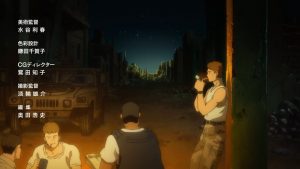 It obviously didn’t take any genius to figure out Banana Fish was going to be the best premiere so far in this young season, and by a wide margin. Island was generic as hell, Yuragi-sou no Yuuna-san was literally unwatchable, nothing else much has held my interest. The real question is where this show will stack up when the season’s serious contenders make their bows, but for now I’m quite pleased with the results after one episode. This wasn’t a masterpiece, but it was certainly a substantial and well-produced effort.
It obviously didn’t take any genius to figure out Banana Fish was going to be the best premiere so far in this young season, and by a wide margin. Island was generic as hell, Yuragi-sou no Yuuna-san was literally unwatchable, nothing else much has held my interest. The real question is where this show will stack up when the season’s serious contenders make their bows, but for now I’m quite pleased with the results after one episode. This wasn’t a masterpiece, but it was certainly a substantial and well-produced effort.
 A little background seems in order. Banana Fish is based on a manga of the same name by Yoshida Akimi – a series that ended in 1994. Adaptations of long-finished manga seem, oddly, to have become a thing, and MAPPA (who are something of a specialist in this area) seems a good choice to shepherd this well-respected one. They’ve updated the setting to the present (which has irked some manga fans, I hear), and given the big chair to Utsumi Hiroko – a director whose previous boss work is limited to the two Free series for Kyoto Animation. That’s not a glowing recommendation in my book, but we’ll see – screenwriter Seko Hiroshi is a considerably more reassuring choice.
A little background seems in order. Banana Fish is based on a manga of the same name by Yoshida Akimi – a series that ended in 1994. Adaptations of long-finished manga seem, oddly, to have become a thing, and MAPPA (who are something of a specialist in this area) seems a good choice to shepherd this well-respected one. They’ve updated the setting to the present (which has irked some manga fans, I hear), and given the big chair to Utsumi Hiroko – a director whose previous boss work is limited to the two Free series for Kyoto Animation. That’s not a glowing recommendation in my book, but we’ll see – screenwriter Seko Hiroshi is a considerably more reassuring choice.
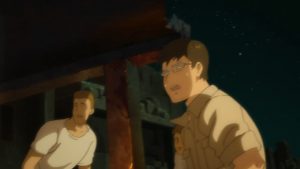 The title comes from “A Perfect Day for Bananafish”, a short story by a young J.D. Salinger that heavily concerns itself with PTSD, pedophilia and suicide. As such there are obvious links to the manga and now anime, which represents NoitaminA doing what it was created to do – present challenging material that would otherwise likely never be produced as anime. I haven’t read the source material but I know it by reputation, and this is a dark ride. I saw nothing in the premiere to make me think that MAPPA would be pulling any punches in adapting it.
The title comes from “A Perfect Day for Bananafish”, a short story by a young J.D. Salinger that heavily concerns itself with PTSD, pedophilia and suicide. As such there are obvious links to the manga and now anime, which represents NoitaminA doing what it was created to do – present challenging material that would otherwise likely never be produced as anime. I haven’t read the source material but I know it by reputation, and this is a dark ride. I saw nothing in the premiere to make me think that MAPPA would be pulling any punches in adapting it.
 Uchida Yuuma is Ash Lynx, the central figure in the story. He’s a 17 year-old gang kingpin in New York (the local cops make note of how remarkable it is that a while boy has gangs of every ethnicity under his sway). Ash was “plucked off the street” by mafioso “Papa” Dino Golzine (the always superb Ishizuka Unshou), who apparently sexually abused Ash and used him as the subject for black market child pornography. His flunky Marvin was a part of this and still lusts after the boy, and makes a suitable partner for Frederick Arthur (Hosoya Yoshimasa) a rival member of Dino’s crime family looking for a way to take Ash down.
Uchida Yuuma is Ash Lynx, the central figure in the story. He’s a 17 year-old gang kingpin in New York (the local cops make note of how remarkable it is that a while boy has gangs of every ethnicity under his sway). Ash was “plucked off the street” by mafioso “Papa” Dino Golzine (the always superb Ishizuka Unshou), who apparently sexually abused Ash and used him as the subject for black market child pornography. His flunky Marvin was a part of this and still lusts after the boy, and makes a suitable partner for Frederick Arthur (Hosoya Yoshimasa) a rival member of Dino’s crime family looking for a way to take Ash down.
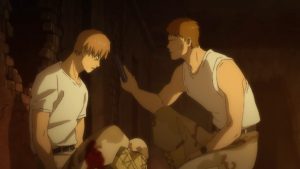 Mixed into this plot soup is the matter of a strange drug that was apparently used on Ash’s soldier older brother (it was Vietnam in the original – seemingly Gulf War or Afghanistan here) and broke him mentally. Those subjected to this drug mutter the phrase “banana fish” over and over for mysterious reasons. A dying fugitive has given Ash a sample, which he’s taken to the local underground doctor to analyze. The drug is possibly the reason Japanese journalist Ibe Shuunichi (Kawada Shinji) and his assistant Okamura Eiji (Nojima Kenji) have come to New York to investigate gang life – though that may be a coincidence.
Mixed into this plot soup is the matter of a strange drug that was apparently used on Ash’s soldier older brother (it was Vietnam in the original – seemingly Gulf War or Afghanistan here) and broke him mentally. Those subjected to this drug mutter the phrase “banana fish” over and over for mysterious reasons. A dying fugitive has given Ash a sample, which he’s taken to the local underground doctor to analyze. The drug is possibly the reason Japanese journalist Ibe Shuunichi (Kawada Shinji) and his assistant Okamura Eiji (Nojima Kenji) have come to New York to investigate gang life – though that may be a coincidence.
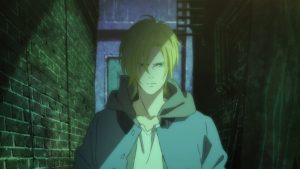 It may be that things move a bit too fast to be ideal in this premiere (whether the manga starts out at the same breakneck pace I don’t know), because all of these threads become messily entangled when Eiji (who’s 19 but looks 14) and Ash’s young protege Skip (Murase Ayumu, as ever anime’s shota-in-residence) become entangled in Arthur’s attempt to take out Ash after Dino realizes he’s come into possession of a sample of the drug. This is a lot for one episode, probably too much, but that being said the last five minutes are the best part of the premiere so that bodes well for the future.
It may be that things move a bit too fast to be ideal in this premiere (whether the manga starts out at the same breakneck pace I don’t know), because all of these threads become messily entangled when Eiji (who’s 19 but looks 14) and Ash’s young protege Skip (Murase Ayumu, as ever anime’s shota-in-residence) become entangled in Arthur’s attempt to take out Ash after Dino realizes he’s come into possession of a sample of the drug. This is a lot for one episode, probably too much, but that being said the last five minutes are the best part of the premiere so that bodes well for the future.
 I’m guessing this is going to be the rare 24-episode NoitaminA run, based on the early premiere date. That’s a good thing as it’s going to need every second it can get, given that the anime is 19 volumes (why this can get two cours and Sakamichi no Apollon – in the hands of Watanabe Shinchirou no less – only one is lost on me). It seems pretty obvious that Eiji is going to fall in love with Ash (he’s started to already), and there are going to be some serious plot entanglements as the drug conspiracy unspools. It all works pretty well – the series looks good, the casting is excellent, and the dialogue is generally pretty smart. I especially liked the way the Japanese visitors were awed and terrified by the brutal nature of New York street life. In short, so far all systems seem to be “go”, even if Banana Fish hasn’t quite soared into the stratosphere yet.
I’m guessing this is going to be the rare 24-episode NoitaminA run, based on the early premiere date. That’s a good thing as it’s going to need every second it can get, given that the anime is 19 volumes (why this can get two cours and Sakamichi no Apollon – in the hands of Watanabe Shinchirou no less – only one is lost on me). It seems pretty obvious that Eiji is going to fall in love with Ash (he’s started to already), and there are going to be some serious plot entanglements as the drug conspiracy unspools. It all works pretty well – the series looks good, the casting is excellent, and the dialogue is generally pretty smart. I especially liked the way the Japanese visitors were awed and terrified by the brutal nature of New York street life. In short, so far all systems seem to be “go”, even if Banana Fish hasn’t quite soared into the stratosphere yet.


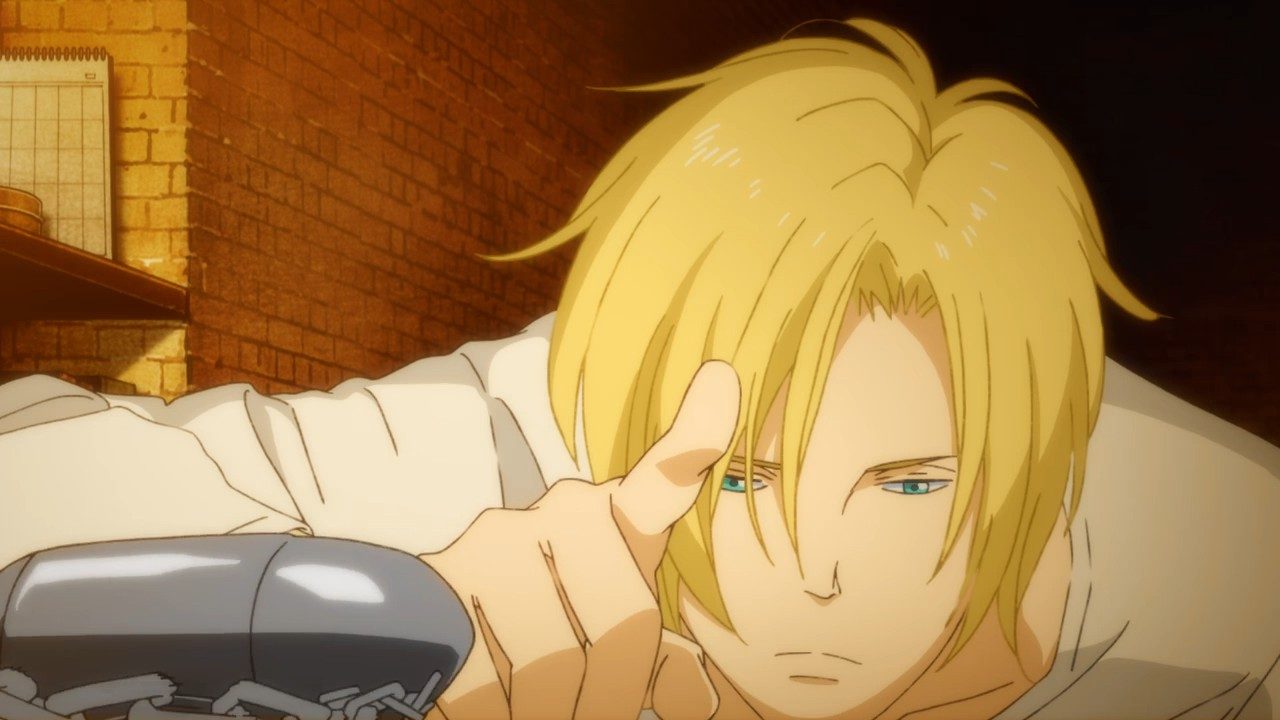

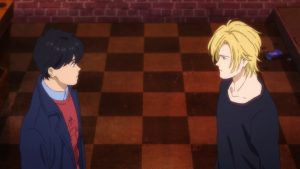
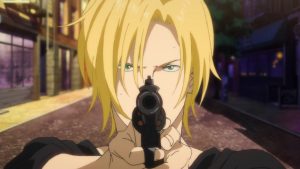
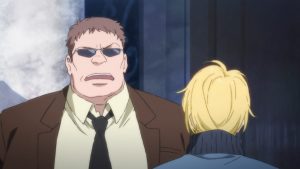


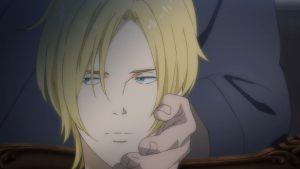
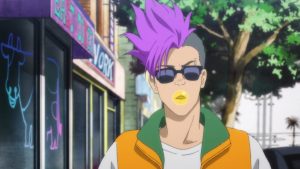
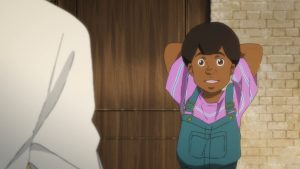
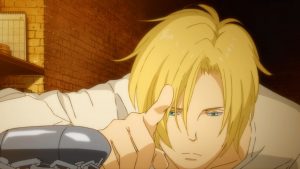
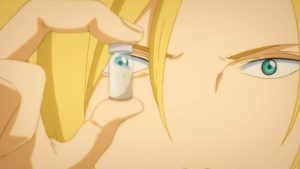
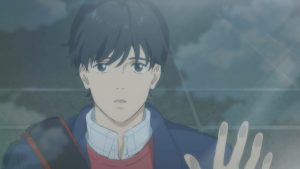
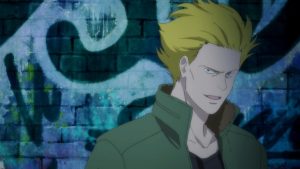

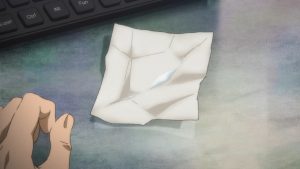
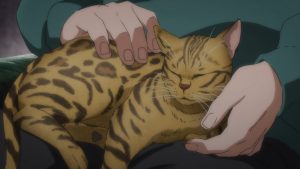

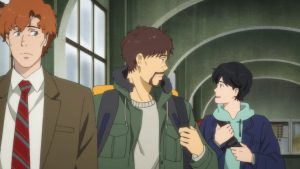

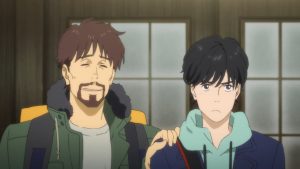
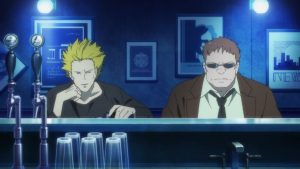

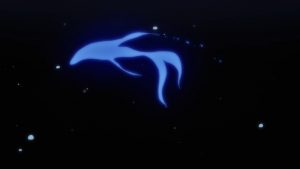

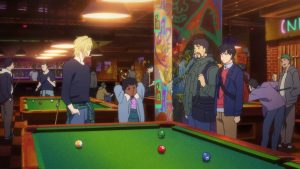
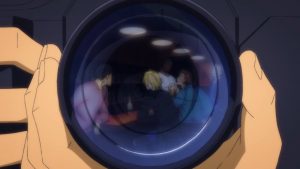
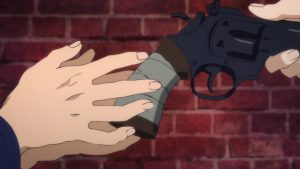
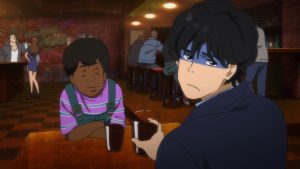
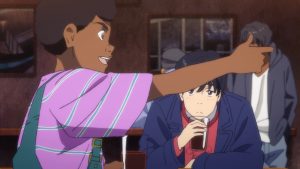


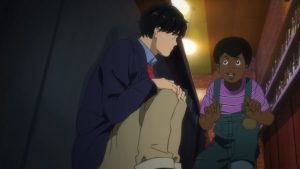
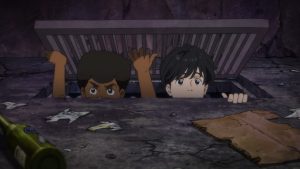


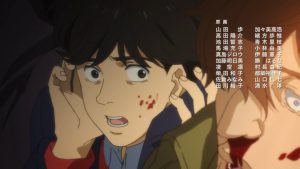

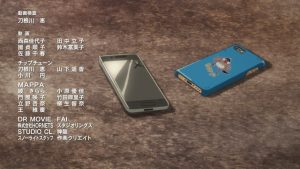


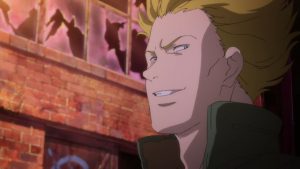
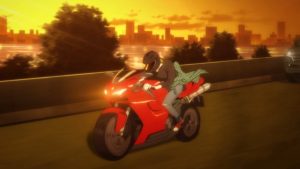


Deluxe
July 6, 2018 at 12:22 amI’m not American but I’m pretty sure those shots of the Statue of Liberty and Empire State Building are meant to indicate that the action takes place in New York City.
Pretty good episode as far as story goes but the rushed narrative didn’t make as enjoyable as I would have liked to. There was something like 12 or 15 characters introduced in one episode, no scene lasted more than two minutes, it was a bit exhausting for a premiere.
As for the reason this manga was adapted, MAPPA looked at the overwhelming success of their own Yuri on Ice and desperately searched for something to quench the thirst of that fanbase they created. They did scout the director of Free from KyoAnu after all.
Guardian Enzo
July 6, 2018 at 1:54 amThat’s a good point about NY, though I would swear they mentioned it was in LA later in the episode.
Collectr
July 6, 2018 at 5:39 amThe dying guy gives Ash a street address in LA, but this episode is set in NY.
elianthos80
July 6, 2018 at 9:36 am@Deluxe: as for the reason this was adapted being to capitalize on YOI’s audience… uhuh I wouldn’t be too sure unless you mean Ash Lynx looking vaguely like a grown-up Yuri Plisetsky in anime form X°D? . The two works are apple and oranges in any possible way and the kind of audience appeal and payoff is also going to be pretty different ( I red the manga years ago btw). Relatedly…
@Enzo in terms of series length/number of episodes available on the other hand BF is a rather beloved shoujo classic ( it’s also a pretty seminal work. I can think of at least two rather popular titles off the top of my head in recent years that seem to have lifted plot details, dynamics and characters from BF. No names ‘because spoilers and because in one case the ending is basically the same ) that stood the test of time –>in this aspect it fits the nostalgia adaptation trend on top of the TV slots original brand/core audience.
24 episodes seem about right to adapt it in its entirety btw. Yoshida-sensei’s stories tend to be – in short – pretty solid, detailed, while still somewhat ‘essential’ in terms of delivering content ( there is a lot of nuance to be found but often in ‘less is more’ fashion ): the anime is adding details to the visuals and softened the charades aesthetic but pacing-wise is probably going (to have to) to keep it pretty tight.
Anyway, it was a good first episode 🙂 and I didn’t really get the feeling it was rushed personally nor I am super worried about (re-)remembering each characters’ names yet. So far the timeframe updates are also working smoothly. If anything challenging dark themes notwithstanding my one worry would be about some attitudes and moments coming out as cringier than intended because they end up being doubly out of time to a Western viewer so to speak…
Guardian Enzo
July 6, 2018 at 6:05 pmWhy the strikethrough text?
elianthos80
July 7, 2018 at 3:57 amMeh :,). I rephrased that part a few times and didn’t realize the tags were still there.
GC
July 6, 2018 at 8:23 pmIts known as being from the boy’s love genre, will be interesting to see how far down that road they will go and how fans unfamiliar with the material will deal with it.
Matti
July 7, 2018 at 4:14 pmWell, if the comments section of the HorribleSubs site is anything to go by, I wouldn’t get my hopes up. The amount of homophobia (or just plain bigotry) in there makes you wonder if this is really 2018.
Guardian Enzo
July 7, 2018 at 5:26 pmIt’s 2018 in anime fandom.
Though, to be fair, that’s hardly the Algonquin roundtable of anime fandom you’re talking about.
Rita
July 11, 2018 at 5:57 pmBanana Fish is like, old school boy’s love stories. The one’s that were mostly drama or mystery stories where the main couple happened to both be guys, but ironically I think that may work against it in this day and age. Nowadays, most BL stuff is very obvious and upfront, and in a way that keeps people who have biases and preconceptions (or just plain homophobic) away since they just wouldn’t watch that stuff. In a way it’s like No. 6 or Shinsekai Yori, where I’m a bit concerned some people will go in not realizing that and then absolutely flip and just make that part of the discussion that should’ve been story or character story into a big old flame fest.
Eric Henwood-Greer
July 12, 2018 at 1:35 amIt’s not all that different in a way from something like Moto Hagio’s Heart of Thomas (as opposed to some of her later works) in that I think there’s a romantic same-sex relationship there, but anything more has to be assumed (don’t get me wrong, personally I think it’s fair game to assume more–although I think Ash is shown as too, well, damaged for lack of a better word to want a sexual relationship).
And man, I wish that a previous comment hadn’t made me check out that HorribleSubs comment thread… Just, wow.
The manga is an all time fave of mine when it comes to translated titles–it was one of the first titles I found as a teenager in the 90s that really spoke to me (and I was upset when Viz stopped at volume 7–but they then went back and republished all of the volumes about five years later unflipped but with a slightly censored translation). I think Viz actually expected it to take off due to its Japanese reputation–they began translating it less than five years after it concluded in Japan and it was one of the key titles of their Pulp magazine and manga imprint which targeted a more “mature” market. But it never seemed to catch on. When they finally published it all unflipped it was under the ShojoBeat imprint but it never really caught on there–probably partly due to not being the kind of title that N Americans, especially then, would associate with Shojo. I have a friend who worked at Viz during that era and said that was one reason why the later volumes had such small print runs (and are hard to find now at a reasonable price–I’m pleased Viz will be reprinting). Anyway, I simply never thought we’d see an anime adaptation, and so far I’m genuinely pleased even if some aspects baffle me (mainly updating it to the present–which mostly works, although NYC is vastly different now than it was in 1985, and it just seems an unnecessary change).